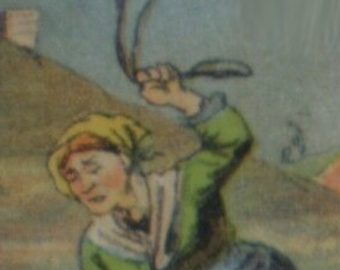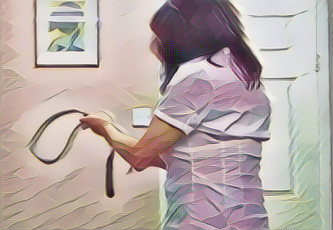During the early 1970s, my mother had a little part-time job which helped with the bills but meant that I had to be looked after by someone else. Not having any relatives living close to us, she decided to put me in the care of Mrs Mason, a local registered childminder.
Mrs Mason’s house was posh, with everything in its place. The children were only allowed in the back room, which served as the playroom and led to their section of the garden. The rest of the house was out of bounds.
I usually went to Mrs Mason’s a couple of afternoons after school, and every Saturday morning. There were generally three or four other children at her house at the same time,
All us children generally enjoyed the experience – there were lots of toys and it was nice to have regular friends there to play with. Mrs Mason was, I would say, kind but firm. She clearly enjoyed working with children but at the same time, she stood no nonsense.
Mrs Mason was a striking figure, a 70-year-old spinster whose presence filled the room the moment she entered. She stood tall and upright, her back perfectly straight despite her age, and her movements were always deliberate and precise. Her face was a map of deep-set wrinkles, each one telling a story of years spent caring for children and running her household with unwavering discipline. Her eyes, a piercing shade of blue, sparkled with intelligence and a hint of mischief, though they could turn steely in an instant if a child misbehaved. Her hair, once jet black, was now a silvery white, always pulled back into a tight, no-nonsense bun at the nape of her neck, not a strand out of place. She wore round, wire-rimmed glasses that perched precariously on the end of her nose, and she had a habit of peering over them when she was about to deliver a stern word or a gentle smile. Mrs Mason’s attire was as meticulous as her manner: she favored crisp, high-collared blouses in pale colors, always buttoned to the top, and long, dark skirts that brushed her ankles. Over her clothes, she wore a starched white apron, its pockets filled with handkerchiefs, peppermints, and the occasional wooden spoon. She had a fondness for sensible, sturdy shoes that made a soft tapping sound on the wooden floors as she walked. There was a faint scent of lavender about her, and she always wore a small silver brooch shaped like a cat, pinned just above her heart. Her demeanor was a blend of gentle authority and old-fashioned charm, and she had a way of pursing her lips and raising one eyebrow whenever she caught a child’s eye, as if daring them to test her patience. Despite her strictness, there was a warmth in her smile and a twinkle in her eye that made us feel safe, even when we were in trouble. She had a habit of humming old tunes under her breath as she worked, and sometimes, when she thought no one was looking, she would tap her foot in time to a silent melody only she could hear. These little quirks made Mrs Mason unforgettable, and her presence lingered in the memory long after we left her care.
Before becoming a childminder, Mrs Mason had worked in a local infants school but took early retirement. After her retirement, she became a registered childminder. One thing she insisted on from all her clients was permission to smack bottoms when needed. Smacking was still very much an accepted part of family life even then and most of us got the same from our own mums and dads, so it wasn’t exactly a drama, although needless to say, we didn’t much like it!
As I say, Mrs Mason was kind but firm. If you did something naughty, she’d correct you but there was no threat of punishment. If you persisted, there would be a final warning – this time with the clear threat of a smacked bottom if you didn’t come into line. There was no third warning – only corporal punishment.
I remember one particular instance when a boy named Tommy refused to share his toys. Mrs Mason gave him a warning, but he continued to be stubborn. After the final warning, she took him over her knee and delivered a dozen firm smacks. Tommy cried and promised to behave, and from then on, he was much more willing to share.
Tommy’s refusal to share had disrupted the playtime harmony. Mrs Mason, with her usual calm demeanor, approached Tommy and knelt down to his level. “Tommy, you need to share your toys with the other children,” she said gently but firmly. Tommy crossed his arms and shook his head defiantly.
Mrs Mason sighed and gave him a final warning, “If you don’t share, you’ll get a smacked bottom.” Tommy, still stubborn, clutched his toys tighter. True to her word, Mrs Mason took Tommy by the hand, sat down on a chair, and placed him over her knee. The room fell silent as the other children watched, a hush settling over us as we sensed what was coming.
She raised her hand and delivered a dozen firm smacks, each one echoing in the quiet room. The sharp sound of her palm meeting Tommy’s bottom seemed to fill the air, and with every smack, Tommy’s body tensed and then jerked. His face screwed up, first in stubbornness, then in pain, and finally in tears. The sting of each smack was unmistakable, and we could almost feel it ourselves, a hot, tingling ache that lingered long after the last blow. Tommy’s defiance quickly melted away, replaced by sobs and promises to behave. Mrs Mason helped him up, gave him a comforting hug, and reminded him of the importance of sharing. From that day on, Tommy was much more willing to share his toys.
We were all subjected to smacked bottoms at one time or another. “This is to make sure it hurts,” she would say, her voice steady but not unkind. The ritual was always the same: the naughty child would be placed over her knee in the traditional nursery position, their legs dangling and their faces flushed with embarrassment and dread. Mrs Mason’s hand, though it looked ordinary, was hard as wood, and she never had any trouble making us cry. The smacks came down in quick succession, each one landing with a crisp, stinging slap that left our bottoms burning and our eyes brimming with tears. Sometimes, the pain was so sharp it took our breath away, and we’d squirm and kick, but Mrs Mason held us firmly in place until the punishment was done.
These spankings were very common, as I suppose they had to be to keep control of up to a half a dozen spirited children. There seemed to be a smacked bottom at least once a week at Mrs Mason’s. The atmosphere in the room would change instantly when a spanking was about to happen – the playful chatter would die down, replaced by a tense silence as we all watched, wide-eyed and anxious, knowing it could be any of us next. Afterward, the punished child would often retreat to a corner, rubbing their sore bottom and sniffling, while the rest of us exchanged nervous glances and tried our best to behave.
All the punishments hurt very much, both physically and emotionally, but they kept us under control and taught us all good moral lessons – with Mrs Mason’s hard hand as the teacher! There was a strange sense of justice in it, a feeling that the world was set right again after the tears had dried and the hugs were given. Even as we dreaded the sting, we knew Mrs Mason cared for us, and her discipline, though strict, was always followed by kindness and reassurance. Looking back, those moments of punishment are etched in my memory, not just for the pain, but for the lessons learned and the odd comfort of knowing someone was there to guide us, even if it meant a sore bottom now and then.






